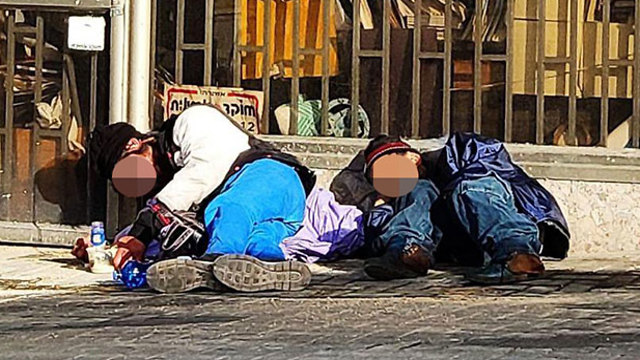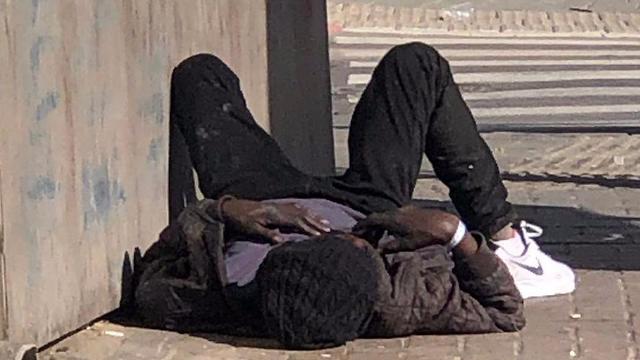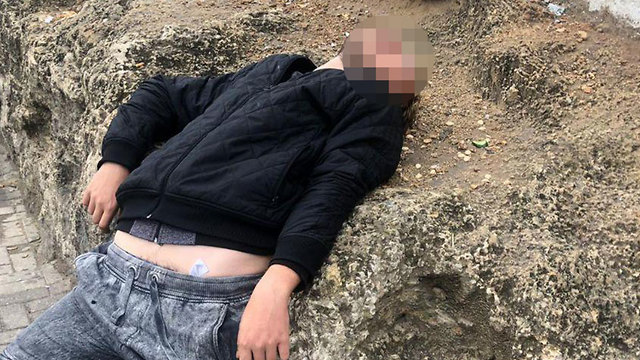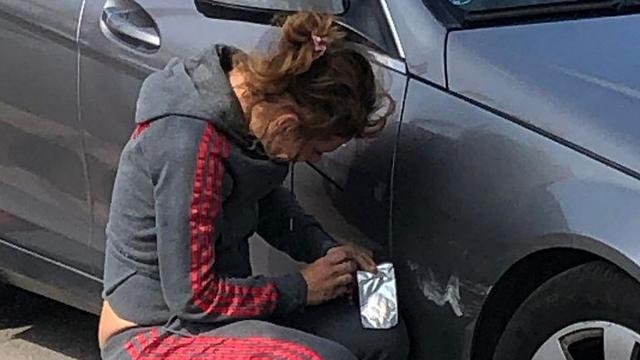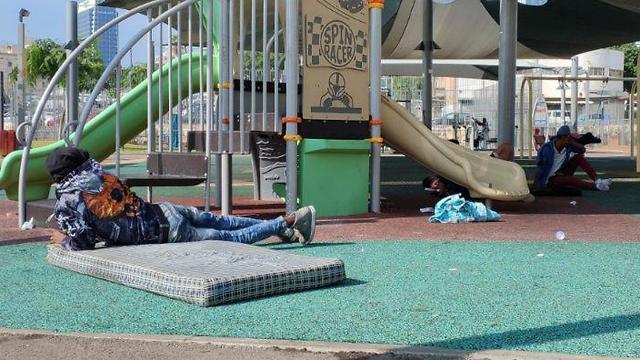It is early afternoon in Levinsky Garden in the southern Tel Aviv neighborhood of Neve Sha'anan, not far from a local school, and dozens of drug addicts are sprawled along benches and grass.
Some are unconscious, while others are barely awake and using – either injecting or smoking – their recently illicitly bought drugs, in the open with no one even looking twice.
This garden is allegedly a family friendly space, where people hang out and kids walk through to get to school and back.
Three men and a woman rise from the derelict crowd, slowly making their way towards two young drug dealers sitting on the benches, slinging their dope with no fear of arrest.
The four individuals are attired in what has become a standard look for these poor souls - dirty and disheveled clothes, missing teeth and filth covering their bodies.
They purchase some sort of a synthetic drug and wobble towards a vacant bench. One pulls out a bong and they begin getting high.
After a short while, all four collapse on the bench or the ground, a glazed look in their eyes.
While for many years now certain areas in southern Tel Aviv have became associated with prostitution, drugs and crime, this year has seen a worrying increase of the phenomenon in the area.
Tel Aviv residents near the Central Bus Station, in Florentin, Jaffa and even Rothschild Boulevard, have complained of hundreds of junkies roaming the streets all day, wandering between dealers and drug dens, lolling in any free space they can find.
The dangerous combination of cheap synthetic drugs, designer drugs falsely perceived as benign and easy accessibility to them has created a new phenomenon terrorizing the residents of southern Tel Aviv.
6 View gallery
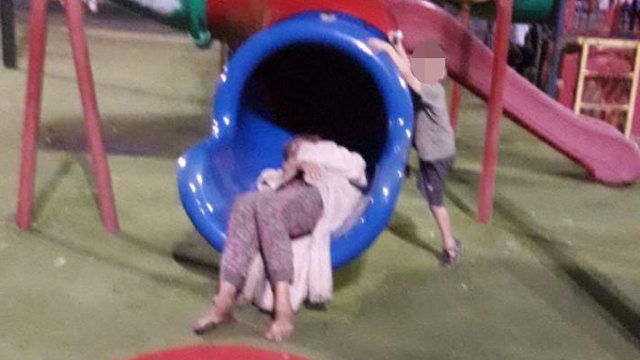

A drug addict lies on a children's slide in Levinksy Garden in southern Tel Aviv
(Photo: Ynet)
Talks with residents illustrate the lackluster effort and hopelessness of the police and Tel Aviv Municipality in face of this problem.
Essentially, addicts and dealers are "pushed" towards the area around Levinksy Garden. Even if they deal or abuse outside that boundary, a random policeman or squad car will quickly order them to go back "home" in the south part of the city.
"This is a new kind of junkie,"says David Agaev, an activist working in rehabilitation for the homeless and drug addicts. "They got hooked on the new and cheap synthetics that have massively penetrated into Israel over the last few years."
Agaev mainly talks about two kinds of drugs.
The first type is commonly called "corner store drugs", which in contrast to the synthetic cannabinoids that have emerged in Israel over the last decade, are something completely different.
Usually, these are dried sage leaves mixed with chemical substances in household labs, often made by criminal organizations. They come in various forms including pills, soluble tablets that are snorted or drunk or as a dried mix for smoking in a bong or a joint.
The second type is called "Tina" and is basically crystal meth.
According to the Health Ministry, this drug is three times more addictive than cocaine and causes hallucinations and delusions, severe sleep disorders, sickness, cardiac arrest and panic attacks.
Crystal meth was first synthesized in the 1940s as a pain and stress reliever, being given to Japanese Kamikaze pilots and Nazi Wehrmacht soldiers to rid them of any sense of fear or anxiety in combat. The U.S. Department of Health and the DEA have in the past declared the use of the drug in the United States as an epidemic.
The main problem with meth is the rather simple method it is created. It does not require much space, which means that it can be made in small apartments and basements, of which there are many in south Tel Aviv.
Agaev points to the end of the Second Lebanon War in 2006 as the breaking point.
"The northern border was closed off by the army, which hampered the smuggling of hashish and cannabis into Israel from Lebanon. The Israelis just found a way around it," he says.
"You can buy drugs on the cheap. They cost nothing and are very addictive. The drug operates on the nervous and muscle system, creating a terrible dependency and causing severe schizophrenia for the user. These are the 'Modern Junkies'."
Agaev shows Akko Alley, one of the most infamous drug-dealing centers in the area, filled with abandoned stores and corner shops. There you can buy cheap drugs amid dozens of loud junkies trying to get a hit.
One of the junkies, shirtless and with clotted and puss-filled lacerations all over his body, smiles a sad, toothless grin.
According to him, he went into rehab several months ago, but lacking any permanent housing was forced back to streets and drug use.
Next to him stands a homeless female prostitute, clad in a dirty shirt several times too big over a large headscarf as a dress and glasses without lenses.
She says she's 35, but she looks older, dressing and undressing in the open for no apparent reason.
She says she has been living on the streets for three years now, having also been in rehab lately, but she too went back to the streets where she managed to stay clean for less than an hour.
Moti Katz, a member of the neighborhood's council, points out the area where the old Central Station used to be, which is now home to a police station and a pair of new parks.
Not far from the station, he shows us streets where prostitution and drugs are solicited in the open, in clear sight of the cops.
"It is absurd," he says. "This is the city's backyard. There are so many cops here but they don't do anything. It's like we're not even a part of Tel Aviv."
"You go to Hasharon Park, about 200 meters from here, and maybe once a day you'll see a cop car turn up just to throw the junkies back to the Central Bus Station. All they care about is it not spreading to the center of the city," Katz says.
Many junkies agree with Katz.
One of them says he used to go into Jaffa or to Hasharon Garden, only to collapse, ask for help and then be loaded "like an animal" into an ambulance and ejected at Levinsky Garden.
A female homeless junkie says she prefers to sleep in the massive Yarkon Park in northern Tel Aviv, where it's much safer for women, but the police keep pushing her back to Levinsky.
"Only in the south they leave us alone", she says.
An Israel Police spokesman said that law enforcement is taking active steps to combat the phenomenon.
"As part of its ongoing battle against drugs, police activities, both seen and unseen, are done against trafficking and dealing of drugs," the police said.
Tel Aviv Municipality said that it was "aware of the worsening situation and will coordinate our efforts with the police to mitigate the issue."
City Hall also said it provided rehabilitation options for addicts.
"Tel Aviv municipally assists the effort in the rehabilitation of homeless and addicts through social services."
The Health Ministry said that there are three treatment facilities for addicts in the city.
"There are three medical centers for addicts in Tel Aviv," a spokesperson for the ministry said. "Yasur center on Hamasger Street, Tzur Aviv center on Harakevet Street and the Edelson center at Ichilov Hospital. We are aware of the increase in wide use of 'corner shop drugs' and are working on a thorough plan and guidelines to deal with the issue."


